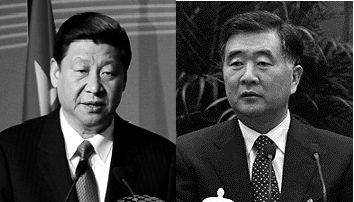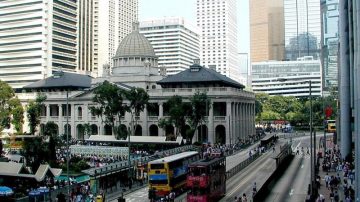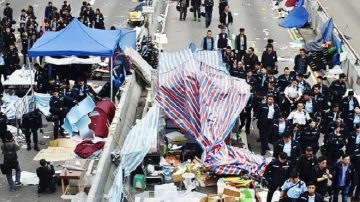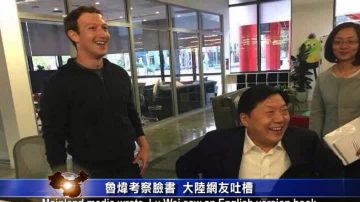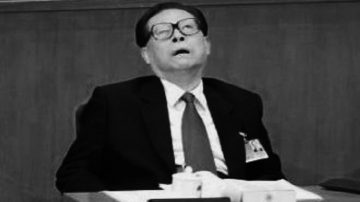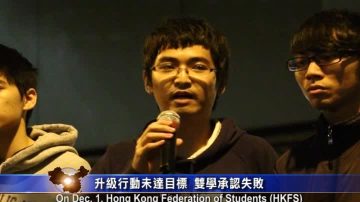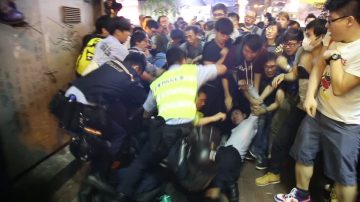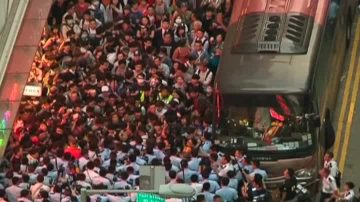【新唐人2014年12月09日讯】香港占中运动持续至今已有70多天,特首梁振英日前表示,会在适当时候宣布金钟占领区清场日期,并指占领后期,参与的人越少,行动会越激烈。对此,学联回应,愈来愈激烈的是警方。面对不见结束迹象的占中运动,中共当局会采取甚么策略呢?我们一起来看报导。
香港特首梁振英7号考察深圳前海后表示,当局已经有心理及行动上的准备,占领行动到了后期,人数越少,留下来的参与者会越激烈,警方在清场或协助执达主任执行法院命令时,可能会遇到激烈抵抗。梁振英要求金钟和铜锣湾的占领人士,尤其是年轻人和学生,尽快撤离。
针对学民思潮成员绝食要求重启政改的诉求,梁振英表示,绝食及占中的学生不清楚《基本法》及人大决定,他还说,政改工作从没有停过,“不存在”重启政改五部曲。
学联副秘书长岑敖晖则回应,使用武力愈来愈激烈的是警方。他们与占领者商讨后,并没有打算现阶段撤离。岑敖晖还表示,即使占领结束,学生也会继续抗争,包括在政改方案出炉时向政府及立法会议员施加更大压力。
据了解,警方已作好准备,会在这个星期协助执达吏在中环执行禁制令。有占中人士向香港《明报》透露,将成立一个“勇武派”组织,以盾牌等守住防线。
英国《金融时报》指出,面对行动逐步升级的示威者,北京“等待抗议结束”的策略或许不再站得住脚。它必须要么作出让步,要么采取果断行动以结束抗议活动。但是,这两个选择,哪个也不容易。
旅美中国社会问题研究人士张健:“对待占中,让它是非常棘手的问题,第一不能用军队武力镇压,会导致国际社会可能对中国(共)进行全面的制裁,它现在是内忧外患,在经济上急需大量的订单,它也不能对香港普选有真正的回应,因为香港一旦实行真正普选,有可能全中国所有地方都会要求进行真正的普选,中共无法开这个口子。”
北京时政观察人士华颇:“我想,中共在等时机,它已经看到了香港占中者发生了一些错误,比如冲击立法会、冲击特首总部,中共在找一种镇压藉口,只要占中者继续犯错,被中共抓住把柄了,它就会让国际社会看,它就会以暴制暴。但说是不是像六四那样真枪实弹,我看不大可能。”
《金融时报》报导指出,香港这场危机是对中共国家主席习近平领导能力的首次真正考验。在“一国两制”所提供的法律保护下,坚定、理想主义的香港年轻抗议者不会轻易被吓倒。
张健:“香港毕竟是被英国统治这么多年,每一个人都具备民主价值的观念,中共又号称依法治国,号称有基本法在前面,中共又被自己的东西所禁锢住了,这就是现在产生这样一个非常胶着的原因之一。”
旅美中国社会问题研究人士张健指出,香港争民主运动是中共江派刻意挑起的。
张健:“要把习近平拖下水,唯一的方式,现在就是用香港的问题。在一国两制上,在普选上,因为在真普选的问题上,在香港历年的游行活动中,中共的情治部门还是判断非常准确的,一旦把真普选这个问题给搁置之后,香港市民的反弹势必是非常大的,所以用这个方式,有可能会逼迫现政权和江派进行一种内部的交易。”
张健认为,占中运动如果撤退,香港就没有未来。
张健:“如果香港人民退缩了,无论是中共的哪一派都会胜利,首先是中共的胜利,所以香港人民一定要去坚持,才会有希望。”
据报导,香港“伞下爸妈”等10几个团体,7号发起反警察暴力游行。此外,有市民自发举行28小时接力绝食行动,在学民的绝食区外搭起帐篷。不过,学民思潮召集人黄之锋表示,医疗人手不足,不建议学民以外成员加入绝食。
采访/朱智善 编辑/陈洁
Federation of Students Object to Leung Chun-ying's Call for Retreat
How Will Beijing React?
Hong Kong Occupy Central Movement has lasted
over 70 days.
Chief Executive Leung Chun-ying said that he would soon
announce the date for clearing the occupied Admiralty area.
He pointed out that in the later stage of the occupation,
the protesters would be fewer, but action would be more violent.
In this regard, the Federation of Students responded
that it's the police that would be more and more violent.
Faced with the unending Occupy Central Movement,
what strategy will the CCP take?
Please take a look at the following reports.
Hong Kong Chief Executive Leung Chun-ying said
on Dec. 7, before his trip to Shenzhen, that the authorities
are in psychological and physical readiness.
That is, in the later stage of the occupation, the remaining
protesters would be fewer, but they might be more and more
violent, and when the police clear the occupied area or help
the chief bailiff to carry out the court order, they may
encounter fierce resistance.
Leung thus called on those who participate in the occupation
movement at the Admiralty and Causeway Bay, especially
youngsters and students, to evacuate the areas as soon as possible.
As to the fact that Scholarism members use hunger strike to
petition for restarting political reform, Mr. Leung said those
who go on hunger strike and the students participating
in the Occupy Central Movement do not know the "Basic Law"
and the decision made by the National People's Congress.
He added that political reform has never been stopped.
So, there's no need to have the so-called five steps
to restarting political reform.
Deputy Secretary General of the Federation Lester Shum
responded that it is the police that use weapons
more and more violently.
After consulting with those who participate in the Occupy
Central Movement, they have no plan to evacuate the place
at this stage.
Lester Shum also said that even if the occupation ended,
the students will continue to protest, including putting more
pressure on the government and the Legislative Council
after the political reform program is released.
It is understood that the police are poised to assist the bailiff
carry out the injunction at the Central this week.
Some Occupy Central protesters told Ming Pao Daily
that they would set up a "chivalrous faction" organization
to secure the beachhead with shields and other stuff.
Financial Times pointed out that faced with the protesters
who have escalated their action, Beijing's tactic of "waiting
for an end to the protest" may no longer be tenable.
It must either make concessions or take decisive action
to end the protest. However, neither one would be an easy task.
US-based China's social problems researcher Zhang Jian:
"Concession is a very tough issue.
For one thing, it cannot use military force to suppress the protesters.
It may lead to the international community's comprehensive
sanctions against the Chinese regime.
It has encountered difficulties at home and abroad for the time
being. On the economic front, it needs a lot of orders badly.
For another, it cannot have a real response to the demand
for universal suffrage in Hong Kong, as once universal suffrage
is granted in Hong Kong, various places across China
are likely to demand genuine universal suffrage too.
As a result, the Chinese regime cannot open this door."
Beijing politics observer Hua Po: "I think, the Chinese regime
is waiting for the timing.
It has noticed some mistakes made by Hong Kong Occupy
Central protesters, such as the attacks on the Legislative Council
and the Chief Executive Headquarters.
The Chinese regime is looking for a pretext for repression.
As long as Occupy Central protesters continue to make mistakes,
the regime may grasp the opportunity to let the international
community know that violence must be met by violence.
But if some say that it may be something like the June-4th,
I think it's unlikely."
The Financial Times reported that the crisis in Hong Kong
is the first real test for Chinese President Xi Jinping's leadership.
Under the legal protection of "One Country, Two System,"
the firm and idealistic young protesters in Hong Kong
would never be intimidated easily.
Zhang Jian: "After all, as Hong Kong was under British rule
for so many years, everyone is accustomed to the concept
of democratic values.
Moreover, since the Chinese regime has also bragged about
its rule of law, under the Basic Law, it has been entangled
by something of its own creation.
This is one of the reasons why it’s so stalemated."
Zhang Jian pointed out that the democratic movement
in Hong Kong was deliberately instigated by the Jiang faction.
Zhang Jian: "To drag Xi Jinping into trouble, the only way now
is to use the crisis in Hong Kong.
In terms of the 'One Country, Two System' and universal suffrage,
in the marching activities in Hong Kong on the issue of genuine
universal suffrage in the past, the CCP intelligence agency's
judgment was quite good.
Once the problem with genuine universal suffrage is put off,
Hong Kong people's reaction would be very strong.
So, this approach may force the ruling regime to have
an internal deal with the Jiang faction."
Zhang Jian believes retreat will only bring an end
to the future of Hong Kong.
Zhang Jian: "If Hong Kong people retreat, either faction
within the CCP would be the winner.
So, Hong Kong people must stand firm, so that it may succeed.
If they lose the streets, they would lose Hong Kong's future."
It is reported that over ten organizations in Hong Kong,
including the Umbrella Parents,
launched an anti-police brutality march on Dec. 7.
In addition, some residents voluntarily participated in the
28-hour hunger strike relay campaign in the tents outside
the hunger strike area occupied by Scholarism.
However, Scholarism student leader Joshua Wong said
that due to the shortage of medical personnel,
people other than Scholarism members are not encouraged
to join the hunger strike.
Interview/Zhu Zhishan Edit/ChenJie
香港特首梁振英7号考察深圳前海后表示,当局已经有心理及行动上的准备,占领行动到了后期,人数越少,留下来的参与者会越激烈,警方在清场或协助执达主任执行法院命令时,可能会遇到激烈抵抗。梁振英要求金钟和铜锣湾的占领人士,尤其是年轻人和学生,尽快撤离。
针对学民思潮成员绝食要求重启政改的诉求,梁振英表示,绝食及占中的学生不清楚《基本法》及人大决定,他还说,政改工作从没有停过,“不存在”重启政改五部曲。
学联副秘书长岑敖晖则回应,使用武力愈来愈激烈的是警方。他们与占领者商讨后,并没有打算现阶段撤离。岑敖晖还表示,即使占领结束,学生也会继续抗争,包括在政改方案出炉时向政府及立法会议员施加更大压力。
据了解,警方已作好准备,会在这个星期协助执达吏在中环执行禁制令。有占中人士向香港《明报》透露,将成立一个“勇武派”组织,以盾牌等守住防线。
英国《金融时报》指出,面对行动逐步升级的示威者,北京“等待抗议结束”的策略或许不再站得住脚。它必须要么作出让步,要么采取果断行动以结束抗议活动。但是,这两个选择,哪个也不容易。
旅美中国社会问题研究人士张健:“对待占中,让它是非常棘手的问题,第一不能用军队武力镇压,会导致国际社会可能对中国(共)进行全面的制裁,它现在是内忧外患,在经济上急需大量的订单,它也不能对香港普选有真正的回应,因为香港一旦实行真正普选,有可能全中国所有地方都会要求进行真正的普选,中共无法开这个口子。”
北京时政观察人士华颇:“我想,中共在等时机,它已经看到了香港占中者发生了一些错误,比如冲击立法会、冲击特首总部,中共在找一种镇压藉口,只要占中者继续犯错,被中共抓住把柄了,它就会让国际社会看,它就会以暴制暴。但说是不是像六四那样真枪实弹,我看不大可能。”
《金融时报》报导指出,香港这场危机是对中共国家主席习近平领导能力的首次真正考验。在“一国两制”所提供的法律保护下,坚定、理想主义的香港年轻抗议者不会轻易被吓倒。
张健:“香港毕竟是被英国统治这么多年,每一个人都具备民主价值的观念,中共又号称依法治国,号称有基本法在前面,中共又被自己的东西所禁锢住了,这就是现在产生这样一个非常胶着的原因之一。”
旅美中国社会问题研究人士张健指出,香港争民主运动是中共江派刻意挑起的。
张健:“要把习近平拖下水,唯一的方式,现在就是用香港的问题。在一国两制上,在普选上,因为在真普选的问题上,在香港历年的游行活动中,中共的情治部门还是判断非常准确的,一旦把真普选这个问题给搁置之后,香港市民的反弹势必是非常大的,所以用这个方式,有可能会逼迫现政权和江派进行一种内部的交易。”
张健认为,占中运动如果撤退,香港就没有未来。
张健:“如果香港人民退缩了,无论是中共的哪一派都会胜利,首先是中共的胜利,所以香港人民一定要去坚持,才会有希望。”
据报导,香港“伞下爸妈”等10几个团体,7号发起反警察暴力游行。此外,有市民自发举行28小时接力绝食行动,在学民的绝食区外搭起帐篷。不过,学民思潮召集人黄之锋表示,医疗人手不足,不建议学民以外成员加入绝食。
采访/朱智善 编辑/陈洁
Federation of Students Object to Leung Chun-ying's Call for Retreat
How Will Beijing React?
Hong Kong Occupy Central Movement has lasted
over 70 days.
Chief Executive Leung Chun-ying said that he would soon
announce the date for clearing the occupied Admiralty area.
He pointed out that in the later stage of the occupation,
the protesters would be fewer, but action would be more violent.
In this regard, the Federation of Students responded
that it's the police that would be more and more violent.
Faced with the unending Occupy Central Movement,
what strategy will the CCP take?
Please take a look at the following reports.
Hong Kong Chief Executive Leung Chun-ying said
on Dec. 7, before his trip to Shenzhen, that the authorities
are in psychological and physical readiness.
That is, in the later stage of the occupation, the remaining
protesters would be fewer, but they might be more and more
violent, and when the police clear the occupied area or help
the chief bailiff to carry out the court order, they may
encounter fierce resistance.
Leung thus called on those who participate in the occupation
movement at the Admiralty and Causeway Bay, especially
youngsters and students, to evacuate the areas as soon as possible.
As to the fact that Scholarism members use hunger strike to
petition for restarting political reform, Mr. Leung said those
who go on hunger strike and the students participating
in the Occupy Central Movement do not know the "Basic Law"
and the decision made by the National People's Congress.
He added that political reform has never been stopped.
So, there's no need to have the so-called five steps
to restarting political reform.
Deputy Secretary General of the Federation Lester Shum
responded that it is the police that use weapons
more and more violently.
After consulting with those who participate in the Occupy
Central Movement, they have no plan to evacuate the place
at this stage.
Lester Shum also said that even if the occupation ended,
the students will continue to protest, including putting more
pressure on the government and the Legislative Council
after the political reform program is released.
It is understood that the police are poised to assist the bailiff
carry out the injunction at the Central this week.
Some Occupy Central protesters told Ming Pao Daily
that they would set up a "chivalrous faction" organization
to secure the beachhead with shields and other stuff.
Financial Times pointed out that faced with the protesters
who have escalated their action, Beijing's tactic of "waiting
for an end to the protest" may no longer be tenable.
It must either make concessions or take decisive action
to end the protest. However, neither one would be an easy task.
US-based China's social problems researcher Zhang Jian:
"Concession is a very tough issue.
For one thing, it cannot use military force to suppress the protesters.
It may lead to the international community's comprehensive
sanctions against the Chinese regime.
It has encountered difficulties at home and abroad for the time
being. On the economic front, it needs a lot of orders badly.
For another, it cannot have a real response to the demand
for universal suffrage in Hong Kong, as once universal suffrage
is granted in Hong Kong, various places across China
are likely to demand genuine universal suffrage too.
As a result, the Chinese regime cannot open this door."
Beijing politics observer Hua Po: "I think, the Chinese regime
is waiting for the timing.
It has noticed some mistakes made by Hong Kong Occupy
Central protesters, such as the attacks on the Legislative Council
and the Chief Executive Headquarters.
The Chinese regime is looking for a pretext for repression.
As long as Occupy Central protesters continue to make mistakes,
the regime may grasp the opportunity to let the international
community know that violence must be met by violence.
But if some say that it may be something like the June-4th,
I think it's unlikely."
The Financial Times reported that the crisis in Hong Kong
is the first real test for Chinese President Xi Jinping's leadership.
Under the legal protection of "One Country, Two System,"
the firm and idealistic young protesters in Hong Kong
would never be intimidated easily.
Zhang Jian: "After all, as Hong Kong was under British rule
for so many years, everyone is accustomed to the concept
of democratic values.
Moreover, since the Chinese regime has also bragged about
its rule of law, under the Basic Law, it has been entangled
by something of its own creation.
This is one of the reasons why it’s so stalemated."
Zhang Jian pointed out that the democratic movement
in Hong Kong was deliberately instigated by the Jiang faction.
Zhang Jian: "To drag Xi Jinping into trouble, the only way now
is to use the crisis in Hong Kong.
In terms of the 'One Country, Two System' and universal suffrage,
in the marching activities in Hong Kong on the issue of genuine
universal suffrage in the past, the CCP intelligence agency's
judgment was quite good.
Once the problem with genuine universal suffrage is put off,
Hong Kong people's reaction would be very strong.
So, this approach may force the ruling regime to have
an internal deal with the Jiang faction."
Zhang Jian believes retreat will only bring an end
to the future of Hong Kong.
Zhang Jian: "If Hong Kong people retreat, either faction
within the CCP would be the winner.
So, Hong Kong people must stand firm, so that it may succeed.
If they lose the streets, they would lose Hong Kong's future."
It is reported that over ten organizations in Hong Kong,
including the Umbrella Parents,
launched an anti-police brutality march on Dec. 7.
In addition, some residents voluntarily participated in the
28-hour hunger strike relay campaign in the tents outside
the hunger strike area occupied by Scholarism.
However, Scholarism student leader Joshua Wong said
that due to the shortage of medical personnel,
people other than Scholarism members are not encouraged
to join the hunger strike.
Interview/Zhu Zhishan Edit/ChenJie

